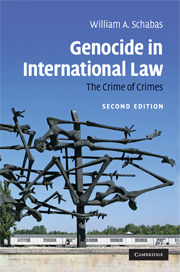Book contents
- Frontmatter
- Contents
- Preface to the first edition
- Preface to the second edition
- Acknowledgments
- List of abbreviations
- Introduction
- 1 Origins of the legal prohibition of genocide
- 2 Drafting of the Convention and subsequent normative developments
- 3 Groups protected by the Convention
- 4 The physical element or actus reus of genocide
- 5 The mental element or mens rea of genocide
- 6 ‘Other acts’ of genocide
- 7 Defences to genocide
- 8 Prosecution of genocide by international and domestic tribunals
- 9 State responsibility and the role of the International Court of Justice
- 10 Prevention of genocide
- 11 Treaty law questions and the Convention
- Conclusions
- Appendix: The three principal drafts of the Convention
- Bibliography
- Index
1 - Origins of the legal prohibition of genocide
Published online by Cambridge University Press: 07 July 2009
- Frontmatter
- Contents
- Preface to the first edition
- Preface to the second edition
- Acknowledgments
- List of abbreviations
- Introduction
- 1 Origins of the legal prohibition of genocide
- 2 Drafting of the Convention and subsequent normative developments
- 3 Groups protected by the Convention
- 4 The physical element or actus reus of genocide
- 5 The mental element or mens rea of genocide
- 6 ‘Other acts’ of genocide
- 7 Defences to genocide
- 8 Prosecution of genocide by international and domestic tribunals
- 9 State responsibility and the role of the International Court of Justice
- 10 Prevention of genocide
- 11 Treaty law questions and the Convention
- Conclusions
- Appendix: The three principal drafts of the Convention
- Bibliography
- Index
Summary
Winston Churchill called genocide ‘the crime without a name’. A few years later, the term ‘genocide’ was coined by Raphael Lemkin in his 1944 work, Axis Rule in Occupied Europe. Rarely has a neologism had such rapid success. Within little more than a year of its introduction to the English language, it was being used in the indictment of the International Military Tribunal, and within two, it was the subject of a United Nations General Assembly resolution. But the resolution spoke in the past tense, describing genocide as crimes which ‘have occurred’.
By the time the General Assembly completed its standard setting, with the 1948 adoption of the Convention on the Prevention and Punishment of the Crime of Genocide, ‘genocide’ had a detailed and quite technical definition as a crime against the law of nations. Yet the preamble to that instrument recognizes ‘that at all periods of history genocide has inflicted great losses on humanity’. This study is principally concerned with genocide as a legal norm.
The origins of criminal prosecution of genocide begin with the recognition that persecution of ethnic, national and religious minorities was not only morally outrageous, it might also incur legal liability. As a general rule, genocide involves violent crimes against the person, including murder. Because these crimes have been deemed anti-social since time immemorial, in a sense there is nothing new in the prosecution of genocide to the extent that it overlaps with the crimes of homicide and assault.
- Type
- Chapter
- Information
- Genocide in International LawThe Crime of Crimes, pp. 17 - 58Publisher: Cambridge University PressPrint publication year: 2009



